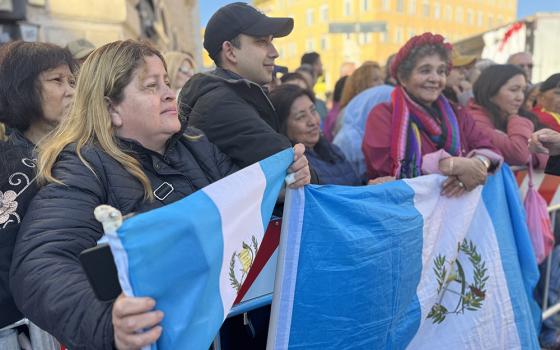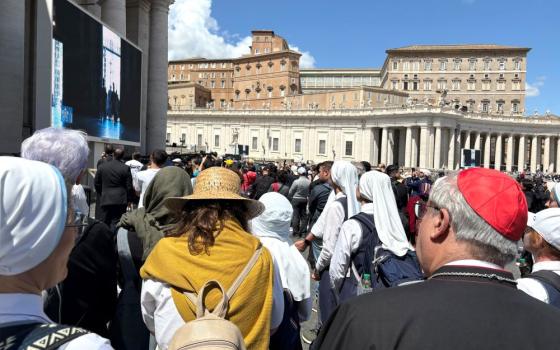People move from their homes to take shelter in Teknaf, Bangladesh, May 14, 2023, during the landfall of Cyclone Mocha. The church has dispatched aid materials to the hardest-hit regions of Myanmar after the deadly cyclone battered the southeast Asian country. (OSV News photo/Jibon Ahmed, Reuters)
The Catholic Church has dispatched aid materials to the hardest-hit regions of Myanmar after deadly Cyclone Mocha battered the southeast Asian country May 14.
The cyclone collapsed houses, brought down communications lines and destroyed poorly constructed camps of Rohingya people -- a Muslim minority persecuted by Myanmar's regime who live mostly in Rakhine state, the one hardest hit by the cyclone.
After the storm left a trail of destruction in Rakhine, the military-ruled government declared 17 townships as a natural disaster-affected area May 15. The winds were as strong as 155 mph and assisted by copious amounts of rainfall.
The storm was reported to be the strongest cyclone of the 16 that have occurred so far this year.
Myanmar's ruling junta put the death toll at three, according to Union of Catholic Asian News (UCA News), while the shadow National Unity Government said that 18 people died in one of the strongest-ever storms to hit the country.
According to Agence France-Presse and nongovernmental organizations on the ground, however, at least 41 people could have died and dozens more are missing in Rakhine, with Al Jazeera reporting that the cyclone may have killed "hundreds."
There has been "a large-scale loss of life in the camps," Brad Hazlett, president of the nongovernmental organization Partners Relief and Development, told CNN.
The state of Rakhine is an impoverished and isolated part of Myanmar that is the site of political violence.
Pope Francis met with a group of Rohingya refugees in Bangladesh Dec. 1, 2017, during his apostolic trip to the country, after hearing their stories of persecution in Myanmar -- the country he visited first.
"The presence of God today is also called 'Rohingya," the pope said at the end of an interfaith meeting held in the garden of the archbishop's residence in Dhaka, Bangladesh, specifically mentioning the Muslim minority by name.
While nearly a million stateless Rohingya members have crossed into neighboring Bangladesh since 2017, fleeing a brutal and bloody crackdown by Myanmar's junta, hundreds of thousands remain in Rakhine, living in dire conditions.
"Poor weather conditions and telecommunications interruptions have made it difficult for our colleagues to assess the full extent of the damage, but early reports indicate that the destruction has been extensive and that already vulnerable people will need humanitarian support," a spokesperson for the U.N. secretary-general said in a daily briefing May 15.
Advertisement
"Our colleagues continue to see what the situation is like while making sure they can also sustain the ongoing programs to respond to the ongoing humanitarian crises in both Myanmar and Bangladesh," the spokesperson's statement said.
Fr. Nereus Tun Min, director of the Catholic charity Karuna Pyay, which is active in Sittwe, the hard-hit port city of Rakhine on the western coast, and neighboring Chin state, told UCA News they have "sent rice, oil, onion and tarpaulins to 40 families whose homes were damaged in Kyaukphyu township."
"We used our Lenten fund for the emergency response," Tun Min said.
The priest said they are in touch with the national office of the church's social arm, Karuna, to provide relief items in Sittwe, Kyauktaw and Kyaukphyu townships, which are among the worst-affected areas. Many residences, including the clergy's house in Sittwe, were badly damaged, the priest said.
"Communications remain cut in Sittwe and Kyauktaw. It's also difficult to reach there due to transportation problems," the priest added.
In Christian majority Chin state, bordering the Chittagong Division of Bangladesh to the west, communication networks that were only recently restored after being cut following the military coup in February 2021 have been disrupted.
Chin state is a stronghold of rebels who have been fighting against military rule in Myanmar since the coup. Also, Paletwa township, where many people internally displaced by the nation's civil war have fled, was hit hard by Cyclone Mocha.
"We are yet to learn what's happening as we don't have communication with the people in Paletwa," a church source who did not wish to be named told UCA News.
A church social worker based in Hakah, the capital of Chin state, said that "about 1,000 houses and several Catholic and Baptist churches in six townships, including Hakah, Matupi and Falam, were damaged."
"Few houses have escaped damage in Sittwe and there is widespread destruction of flimsy bamboo longhouses in displacement camps," the U.N. Office for the Coordination of Humanitarian Affairs said May 15.
In 2008, Cyclone Nargis hit Myanmar's Irrawaddy Delta, leaving more than 135,000 people dead and damaging tens of thousands of homes.





